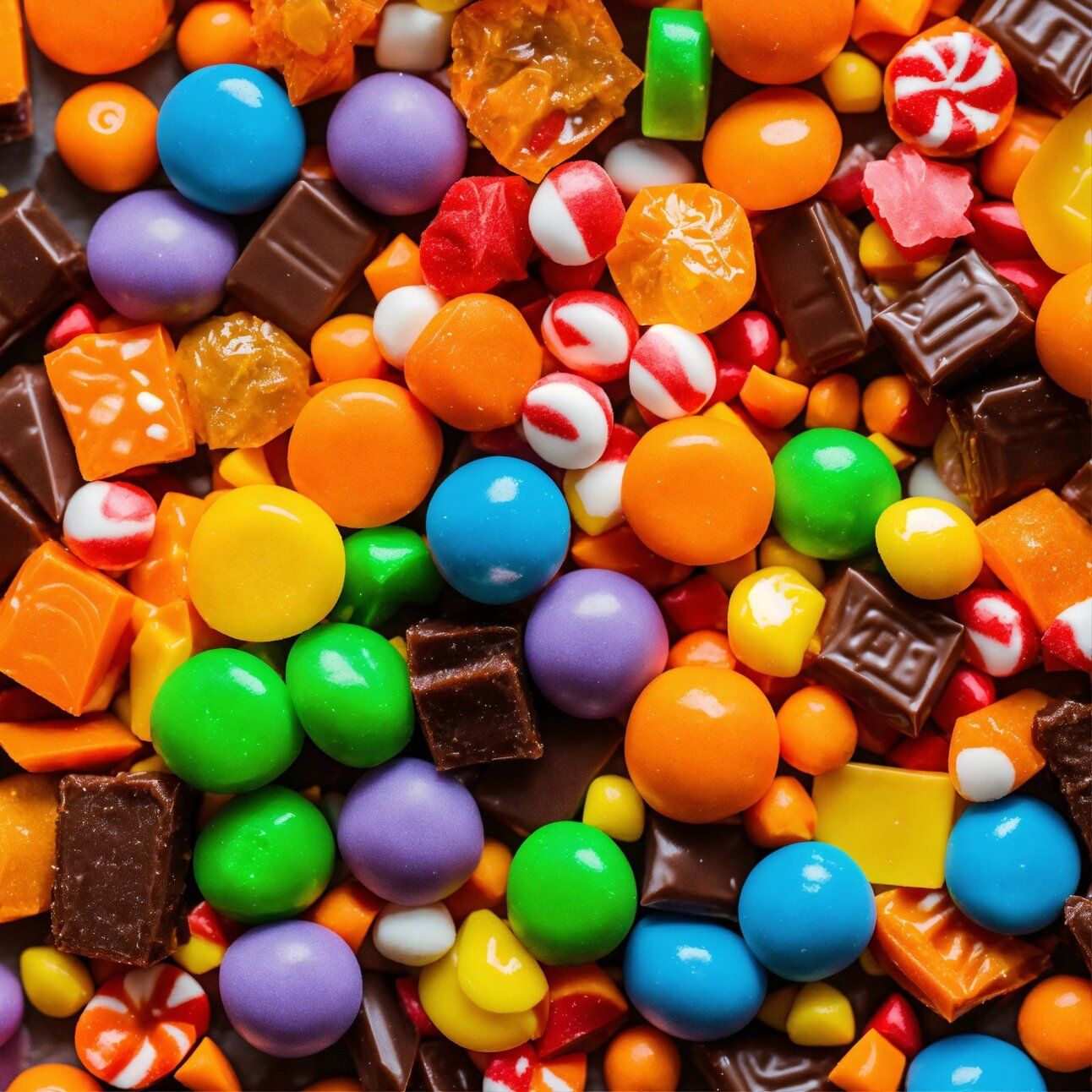Are you grappling with a sweet tooth that just won't quit? Many of us indulge in sugary treats without fully grasping the potential consequences, and one pressing concern that lingers is the link between excessive sugar consumption and the development of diabetes. In this article, we delve deep into the question that many are pondering: Can you get diabetes from eating too much sugar? We're not just here to uncover the truth but also to provide you with the knowledge and guidance needed to make informed choices about your diet. Whether you're a health-conscious individual or someone navigating the complexities of sugar and its impact on the body, this article aims to be your comprehensive guide.
Here is what we will be covering:
· How sugar works
· Glycogen storage
· Insulin resistance & type 2 diabetes
· Natural sugars
· Brain and mood
· Weight gain
· Your organs
· Conclusion

How Sugar Works
It all kicks off the moment sugar touches your taste buds, setting off a fascinating journey of digestion and absorption. Your saliva becomes the first player in this intricate process, employing amylases to dismantle sugar molecules into simpler forms. These enzymes, the amylases, work diligently to break down the chemical bonds in sucrose, transforming it into easily digestible sugars.
As the journey progresses, sugar reaches the stomach, meeting gastric juices and enzymes. In this stage, enzymes play a crucial role in separating sugar molecules from the other components in the food or drink you consume. Once this separation dance is complete, the sugar advances to the small intestine, the epicenter of the absorption process.
Within the small intestine, enzymes continue their work, further breaking down the sugar before it is absorbed into your bloodstream. Glucose takes a direct route into your bloodstream, while fructose opts for a more leisurely pace, mainly metabolizing in the liver. This intricate dance of digestion ensures that the energy from sugar reaches your cells, fueling them for their vital functions.

Glycogen Storage
As glucose enters your bloodstream, it embarks on a vital mission, becoming the fuel that powers your cells. From contracting muscle tissue to supporting brain function and facilitating the production of hormones and enzymes, glucose is the unsung hero in your body's energy narrative. However, like its sweet counterparts, such as fructose, an excess of glucose can pose challenges.
When you consume more glucose than your body requires, the surplus transforms into glycogen. This excess glycogen finds a temporary home in your liver and muscles, forming a reserve that can be tapped into when needed—harking back to our evolutionary roots when prolonged periods without food were not uncommon.
Yet, should your body's glycogen storage reach its limit, any remaining glucose excess takes a different route, morphing into fat and finding sanctuary in your adipose tissue. This surplus fat, if it pushes you into a calorie surplus, can contribute to weight gain and the onset of obesity.

The entrance of sugar into your bloodstream triggers a cascade of events, including a rise in blood sugar levels. This prompts the release of insulin, a vital hormone from the pancreas. Insulin steps in to regulate blood sugar levels by ushering glucose out of the bloodstream and into cells for immediate energy use—a process crucial for avoiding the perils of elevated blood glucose levels, known as hyperglycemia.
However, the catch lies in the excess. Consuming too much sugar can throw off the delicate balance, adversely impacting insulin production and response—an outcome that carries potential risks, from compromising heart health to fueling inflammation. Balancing the sweetness of life with mindful sugar consumption becomes key in navigating these intricate pathways of your body's energy dynamics.
Insulin Resistance & Type 2 Diabetes
An overindulgence in sugar isn't just a threat to your sweet tooth; it can throw your entire metabolic orchestra into disarray. When your sugar intake hits excessive levels, your pancreas is thrust into overdrive, tirelessly churning out insulin. But here's the hitch—this relentless effort can pave the way for insulin resistance, a condition where your body's responsiveness to this vital hormone starts to wane.
Picture this: your body needs more and more insulin to achieve the same blood sugar control. The repercussions? A chain of health issues, including the notorious trio of type 2 diabetes, metabolic syndrome, and cardiovascular disease. Insulin resistance is the linchpin, and its emergence sets the stage for a perilous journey.
As your body resists the insulin plea, your pancreas takes on an increasingly Herculean task, churning out insulin like a well-worn engine. Yet, this heroic effort, sustained over time, can lead to pancreatic burnout—a decline in insulin production that signals the onset of Type 2 Diabetes. This chronic condition, marked by elevated blood sugar levels, is a global concern, affecting over 462 million people worldwide, a staggering six percent of our population.
Natural Sugars
The blame doesn't lie solely with sugar; it's the notorious fructose, lurking in many processed foods and beverages, that amplifies the impact on insulin production. Unlike glucose, the sugar your cells readily metabolize, fructose takes a detour straight to the liver, setting the stage for the intricate dance between sugar, insulin, and the delicate balance of your metabolic symphony. The consequences are profound, and as our world succumbs to the siren call of unhealthy eating, the shadows cast by sugar on insulin production loom larger, foretelling a health crisis on the horizon.
Now, here's the kicker—this sugar-induced havoc isn't limited to the realm of processed sugars lurking in your favorite desserts. Even seemingly innocent natural sugars, like those in honey and fruit juices, can wield a similar double-edged sword when consumed recklessly. The saving grace of whole foods, like fruits, lies in their fiber content—a buffer that slows down the sugar absorption, preventing a metabolic rollercoaster.

But beware of the juicing trap! While the allure of sipping on a refreshing fruit concoction might be strong, the process strips away the fibers, leading to a rapid sugar surge and, in tow, a sharp rise in insulin levels. Opting for whole fruits over their juiced counterparts is a wise move. If you're in the blending mood, throw those fruits in a blender instead; it preserves the precious fiber, keeping your metabolic symphony in harmony.
Brain and Mood
Now that we've unraveled the sugar saga in the bloodstream, let's venture into the intricate dance between dietary sugar, your brain, and the delicate ballet of mood regulation. Brace yourself because the impact is profound, and here's why it matters: Sugar, the tantalizing tempter, flips the switch on your brain's reward center. It's like a symphony of neurotransmitters—dopamine and serotonin—ushering in waves of pleasure and well-being. But, similar to the perils of overindulgence in alcohol or substances, an excessive sugar spree can set off a detrimental loop, casting a shadow over your mood.
Cue the infamous sugar crash—a rollercoaster where blood sugar skyrockets only to nosedive swiftly, leaving you grappling with fatigue, irritability, and a foggy mind. Yet, the impact doesn't stop there. The sugar-loaded storm can brew chronic inflammation in the brain, opening the door to a host of neurological villains like depression, anxiety, and even dementia. This inflammation, a harbinger of oxidative stress, can wreak havoc on cells, fast-tracking the aging process.

But wait, there's more! Sugar, the silent intruder, tiptoes into the hippocampus—the maestro orchestrating memory. Studies with sugar-fed rats revealed a sinister plot: a dwindling army of newborn neurons essential for memory formation and a surge in inflammation-linked chemicals. It's a stark reminder that what we indulge in doesn't just tantalize the taste buds; it weaves a complex tale within the recesses of our minds.
Let's circle back to dopamine—the brain's backstage pass to pleasure. When we indulge in sugar, it's like launching a fireworks display of feel-good neurotransmitters, with dopamine taking center stage. The surge in dopamine levels orchestrates a symphony of pleasure and well-being. Yet, here's the twist: the more sugar becomes a frequent guest, the less sensitive our dopamine receptors become. It's a tale reminiscent of substances like cocaine—initially euphoric, but over time, demanding more to recreate the magic.
As your brain craves an escalating sugar fix, the risk of addiction looms large. The constant pursuit of that sweet high becomes a quest for normalcy. It's a stark reminder of the intricate dance between our cravings and brain chemistry. Beyond the dopamine drama, sugar also dabbles in serotonin territory—a neurotransmitter with a crucial role in regulating mood, appetite, and sleep. Too much sugar can tip the scales, leading to blood sugar crashes, chronic inflammation, and a reshaping of brain structure and function.
To safeguard your cognitive well-being and elevate your performance, consider a mindful reduction in processed sugars—the culprits lurking in cookies, candies, and sodas. It's not just about curbing your sweet tooth; it's about nurturing your brain's harmony and preserving the rhythm of your mood and cognitive prowess.
Weight Gain
However, the sugar saga extends beyond just its impact on the brain and mood. Another well-recognized reason to rein in your processed sugar indulgence is its notorious role in weight gain and the obesity orchestra. Sugar, while packing a caloric punch, fails at satisfying hunger effectively. It tends to sneak into our diets atop the calories we're already consuming, and studies reveal that avid consumers of sugary beverages often tip the scales higher.
Without knowing too many, the daily sugar tally can swiftly add up. The average American casually clocks in at around 270 calories of added sugars daily—equivalent to nearly 1900 calories per week, a stealthy contributor to that half-pound of body fat. The good news? The sugar pendulum swings both ways. Nixing sugary sodas from your diet not only trims your calorie intake but also sets the stage for weight loss. Opting for healthier alternatives like sparkling water, tea, or coffee is an ideal swap. Yet, if a touch of sweetness is non-negotiable, diet sodas can slide into the mix. Numerous studies indicate that replacing sugary delights with artificially sweetened counterparts fosters a calorie cutback, aiding the weight loss journey.

Before we cast judgment on all artificial sweeteners, it's worth noting that most are generally safe when adhering to recommended daily limits, even the often-demonized aspartame and sucralose. An exception might be saccharin, where some evidence suggests potential impacts on gut health and glucose tolerance in certain participants. While the safety spotlight remains on saccharin, it's wise to exercise caution and perhaps sidestep drinks and foods bearing this particular artificial sweetener.
Your Organs
Let's dive into another layer of the sugar saga – its impact beyond mere calorie count. Brace yourself, because sugar isn't just a sweet tooth's delight; it's also a disruptor of your gut microbiome, that bustling community of bacteria and microorganisms residing in your digestive tract. This microbial metropolis isn't just a passive bystander; it plays a pivotal role in regulating your metabolism and immune function. Now, here's the sugar bombshell – indulging in copious amounts of sugar can throw this thriving community into disarray, triggering an increase in hunger and, inevitably, setting the stage for weight gain.
But the mischief doesn't stop there; your heart, the rhythmic powerhouse of your body, also bears the brunt of sugar's antics. Excessive sugar intake is a backstage pass to a heart-wrenching show, with increased risks of high blood pressure, elevated cholesterol levels, and the ominous specter of heart disease looming in the shadows.

Now, let's shift our focus to your pearly whites – sugar's unsuspecting victims. Sugar isn't just a treat for your taste buds; it's a feast for the bacteria partying in your mouth. As these oral bacteria gorge on sugar, they churn out acid, a dental demolition expert that erodes your precious tooth enamel. The result? A sinister trifecta of tooth decay, cavities, and a one-way ticket to dental discomfort. Even seemingly innocent sugary sips from soda or sports drinks can usher in dental erosion, leaving your teeth vulnerable to sensitivity, discoloration, and structural loss. The sugar saga isn't just about calories; it's a multi-organ performance where every bite sweetens the risk.
Conclusion
In a nutshell, sugar is a double-edged sword, offering a burst of energy for your cells, muscles, and brain, yet wielding the power to unleash havoc on your health. Beyond the immediate fuel it provides, excessive sugar intake plays a sinister role in orchestrating a symphony of weight gain, obesity, high blood pressure, elevated cholesterol levels, heart disease, and dental dilemmas.
But the plot thickens – sugar isn't just a culprit for your body; it's a mischievous puppeteer pulling the strings in your brain. Brace yourself for mood swings, cravings, and the looming shadows of addiction. The toll on your mental well-being extends to the risk of wrestling with mood disorders like depression and anxiety.
To navigate these sugar-infested waters and safeguard your optimal health, here's the golden rule: keep your sugar intake in check. I recommend capping it at no more than 10 percent of your daily caloric intake – roughly 50 to 60 grams of added sugar per day. By adhering to this sweet limit, you not only manage your body fat percentage but also steer clear of the unwanted side effects that accompany a sugar-laden lifestyle. So, let's sweeten the deal with moderation and make your health a non-negotiable priority.
If this were helpful, it would mean a lot if you subscribe to my Newsletter. I love researching and writing about the stuff and sharing everything I find in my Newsletter.
Source: Gravity Transformation
